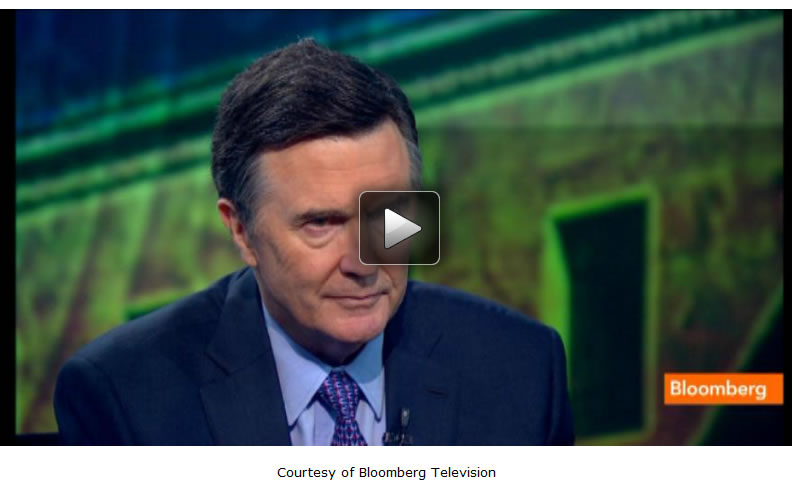Fed Gearing Up to Scale Back on QE
Interest-Rates / Quantitative Easing Jun 04, 2013 - 03:47 AM GMTBy: Bloomberg
 Atlanta Federal Reserve Bank president Dennis Lockhart told Bloomberg TV's Michael McKee today that Fed officials are committed to stimulus even as divergent views on when to start paring back bond purchases create a "mixed message" to investors.
Atlanta Federal Reserve Bank president Dennis Lockhart told Bloomberg TV's Michael McKee today that Fed officials are committed to stimulus even as divergent views on when to start paring back bond purchases create a "mixed message" to investors.
Lockhart said, "There certainly seems to be an acute fixation on the timing of any adjustment to the asset purchase program and I guess I would just encourage everyone to not lose sight of the bigger picture." He went on to say, "Any adjustment is not a major policy shift. The high level of accommodation will stay in place."
Lockhart on whether the economy still needs the full $85 billion in bond purchases every month:
"I think we're approaching a period in which we can consider dialing back the asset purchases to some extent. I do think it's important to emphasize that that's not an exit from asset purchases, it's simply a recalibration of the amount of purchases. I think that's a very important point to make because the sense that some people in the market have had is that suddenly this asset purchase program is going to be effectively yanked and that's not what I see happening. An adjustment."
On what the markets are supposed to make of the dissonance from the Federal Reserve:
"I think to the extent that the market is seeing mixed messages, it simply reflects the debate that is going on among the colleagues in the Federal Open Market Committee. We are at a juncture where it's clear from the minutes that some form of adjustment to asset purchases are being discussed -- we made that clear -- and then there is an array of opinion. Those opinions, when expressed in public, create this sort of sense of mixed message. I think that is simply what it is."
On whether the markets have gotten too far ahead of themselves:
"I never question markets. It's not a single thinker. It's a process of buying and selling and so forth so I don't really question the market per say. I would say that there seems to be an acute fixation on the timing of any adjustment to the asset purchase program. I guess I would just encourage everyone to not lose sight of the bigger picture and I think the bigger picture is that any adjustment is not a major policy shift. The high level of accommodation will stay in place. I have always viewed the asset purchases as a supplement to the main pillar of our policy and that's the short-term interest rate. The policy of keeping rates low will continue."
On when he sees a vote happening:
"I am prepared to consider support, and of course my support is non-voting support this year, over the summer. That would be in the next three meetings. I think it should be on the table and looked at in light of the overall picture that the data presents. the data we are receiving is still very mixed. The ISM report this morning is a good example. I am not getting a clear picture of an economy that is really is tracking with considerable momentum. I tend to be a little more cautious and say maybe in August or September or later in the year. I think the issue can be on the table in any of those meetings.
On whether the disinflationary trend will continue:
I do not think we can dismiss the downside risk related to inflation. I am concerned with the low level that we are measuring inflation. i do not think it is a critical concern at the moment. The reason is inflation expectations appear to be well anchored and measures of inflation expectations are really not indicating a move toward deflationary territory. I am watching the inflation expectation numbers pretty carefully. That is another way of saying I do not think this is a rerun of the fall of 2010. In that period we actually saw inflation expectations moving south very rapidly and so I think we are just in a spell of very soft inflation numbers. My forecast would be a gradual convergence with a target of the FOMC 2%.
On whether he's worried that once the Fed starts talking seriously about tapering, there will be an overreaction in the market:
I think that markets can react in the short term and sometimes they can react with a lot of volatility or with a strong move in one direction or another. I would tend a look at that question as the market absorbs all of that information and then gets into, for lack of a better term, a settling down period. See if we have gotten interest rates at a level that are likely to retard the recovery in some way. Even now with the 10-year treasury at 210, those are historically very low interest rates, so I think it will take something much stronger than we've seen in the last few days for me to be concerned about the market reaction.
Copyright © 2013 Bloomberg - All Rights Reserved Disclaimer: The above is a matter of opinion provided for general information purposes only and is not intended as investment advice. Information and analysis above are derived from sources and utilising methods believed to be reliable, but we cannot accept responsibility for any losses you may incur as a result of this analysis. Individuals should consult with their personal financial advisors.
Bloomberg Archive |
© 2005-2022 http://www.MarketOracle.co.uk - The Market Oracle is a FREE Daily Financial Markets Analysis & Forecasting online publication.




